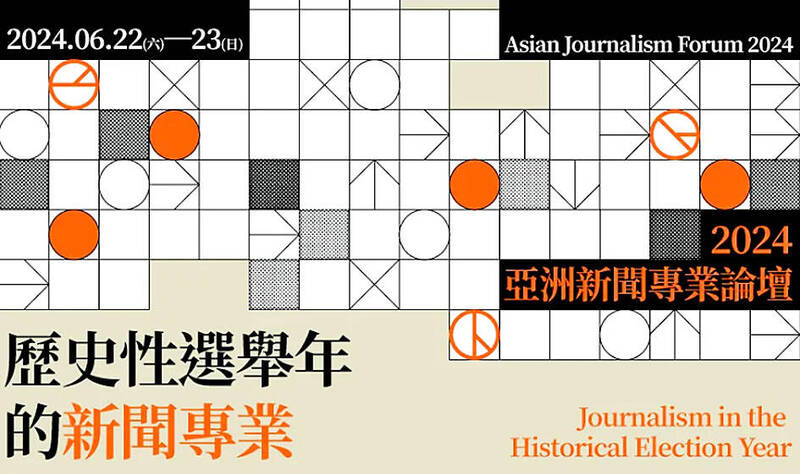《TAIPEI TIMES》 Reporters at forum discuss elections

A poster promoting this year’s Asian Journalism Forum. Photo: Screen grab from Foundation for Excellent Journalism Award’s Web site
GEOPOLITICS: Peace and stability on the Korean Peninsula and in the Taiwan Strait are crucial to the rest of the world, South Korean journalist Lee Ki-ju said
By Lee I-chia / Staff reporter
Several journalists from Asian countries discussed their views on the impact of their countries’ election results on geopolitics at this year’s Asian Journalism Forum held by the Foundation for Excellent Journalism Award (FEJA) in Taipei yesterday.
The two-day forum this year was themed “Journalism in the Historical Election Year” and held at National Taiwan University’s main campus in Taipei.
During his opening remarks, FEJA chairman Su Tzen-ping (蘇正平) said that while democratic systems have multiple dimensions, elections are an important element of them, and this year marks a historic election year, with more than 70 countries holding elections, involving about 4.2 billion people.
People’s voting behavior is closely related to the information they receive, and the drastic changes in the media and communication environment over the past few years have played a crucial role in elections, he said.
In the first session of the forum, which was about observations on the impact of Asian countries’ election results on geopolitics, Hiroki Sugita, editorial writer of Japan’s Kyodo News, said, center-right governments have been in power in Japan for almost the entire post-World War II era.
Japanese are generally more conservative, and have bad memories of the populist government during the war, and the only two center-left governments failed to have good relations with the US, which is a deciding factor for parties to win election, Sugita said.
However, growing national security challenges from China and North Korea over the past few years and the rise of isolationist politicians in the US are pressuring Japan to take a new course, and the public supports the government in its military buildup, he said.
With rising geopolitical instabilities ahead, the Japanese media are facing challenges in maintaining a neutral view in reporting security and foreign affairs, Sugita said.
Journalists must do their best to report stories based on facts, and include views from adversaries to avoid being the cheerleaders of the government or military, he said.
They should stand on the side of democracy when facing authoritarianism, as media can only survive in democracy, he said.
Munhwa Broadcasting Corp reporter Lee Ki-ju from South Korea mentioned a string of scandals surrounding South Korean President Yoon Suk-yeol and his wife, saying that they led to the opposition parties winning the majority of legislative seats and forcing Yoon to focus on diplomacy.
However, Yoon’s extremely pro-US and pro-Japan stance, and Russia and North Korea on Wednesday signing a “comprehensive strategic partnership” pact, have increased tensions on the Korean Peninsula, Lee said.
If former US president Donald Trump returns to power, there would be more uncertainty ahead, he said.
Lee said he is concerned that South Korea is too biased toward the US and Japan, adding that he believes Seoul should revise its position to be more inclusive, balanced and sustainable.
Peace and stability on the Korean Peninsula and in the Taiwan Strait are crucial to the world, he added.
Tempo Digital CEO Wahyu Dhyatmika said that while more than 58 percent of Indonesia’s 204 million voters in February elected former defense minister and general Prabowo Subianto as the next president, the domestic media reported his alleged human rights violations and election meddling, and even called it the “worst election in Indonesia’s history.”
However, broad discussions are possible in the country, he said, adding that and he believes Indonesia would try to keep a balanced relationship with China and the US to benefit from tensions.
Asked about the Indonesian media’s role in the country’s elections and how Prabowo could win, even after reports about his alleged misdoings were published, Dhyatmika said it might be because the media produce the news, but have no control over algorithms of digital platforms.
Other sessions in the forum included discussions on election interference through information manipulation by external political forces, and the roles of misinformation and artificial intelligence generated content in elections.
新聞來源:TAIPEI TIMES












